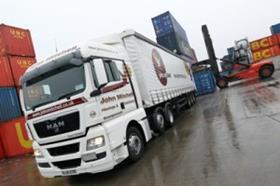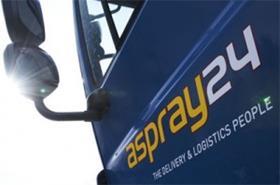For decades the government has been urged to make competition fairer between UK and foreign operators but, now action is being finally taken, how effective will it prove, asks Guy Sheppard.
When the HGV Road User Levy comes into force in April, Rob Hollyman, MD of Purfleet-based UK and international distribution company YTL, is unlikely to celebrate – despite first lobbying for it in the mid-1980s.
The government says it will help create a level playing field for UK operators undercut by foreign competitors that are entitled to deliver three cabotage (domestic) loads before returning to the Continent.
Although Hollyman says YTL regularly loses out to such competition, he doubts whether the levy will have much effect because the use of foreign vehicles has become so much part of UK domestic haulage. “If it had been in place as recently as 10 years ago, it would have perhaps stopped the influx and magnitude of eastern bloc countries coming in today,” he says.
He argues that, as well as lower fuel and labour costs, cheaper ferry charges and vehicle purchase prices enjoyed by foreign operators mean the levy will be far too little to meaningfully bridge the gap in overheads with their UK rivals. Last month, he calculated there was a 24ppl difference between the price of diesel in Luxembourg and the UK. “It works out at 6.9p per mile more for us to run. Eastern bloc countries tend to have two drivers in the cab, so the vehicle can work a lot more hours. And the cost of those two drivers is less than one English driver.”
Varied levy
When introduced, the levy will apply to vehicles of more than 12-tonne GVW and will vary according to vehicle type, weight and number of axles. For most UK operators, the amount will be offset by a reduction in VED and, because it will be paid as a single transaction with VED, no extra paperwork will be involved. The maximum charge will be £10 a day or £1,000 a year. Payment will also be allowed on a weekly or monthly basis.

Iain Mitchell, MD of John Mitchell Haulage & Warehousing in Grangemouth, agrees that the charge won’t make a significant difference. He abandoned delivery work south of the M62 five years ago because of foreign competition. “They are getting loads moved at £200 to £300 less than a Scottish operator can,” he claims. Because foreign competitors will have to pay, at the most, only £20 extra on a trip between Scotland and London, he says their competitive edge will remain largely unchanged.
Routes
According to a study published in 2007, foreign competition has the biggest effect on routes to and from the South East and East because these regions have the main ro-ro ferry terminals.
Using DfT data, Alan McKinnon, professor of logistics at Heriot-Watt University, showed how foreign vehicles accounted for nearly 40% of freight tonnage delivered between Scotland and the South East.
RHA chief executive Geoff Dunning believes that, if anything, this level of penetration has increased since 2007 because of fuel price movements and the UK’s increasing trade imbalance in favour of imports, which tends to encourage more foreign hauliers into the UK. “It’s what I call the return load syndrome. They [foreign operators] want to get back to where they came from so they will do it for anything. That is always going to be a major problem.”
Despite this, he believes the levy is worthwhile. “The critical thing is that the government has responded to our campaign; it has done everything it possibly can within the legal framework it has to work in,” he argues. “It’s a small step in the right direction.”
Under EU law, it is discriminatory and therefore illegal to charge more for foreign than domestic vehicles and, although a distance-based charge is possible, the DfT says it would be more difficult to compensate UK haulers through discounting their VED. Its consultation document on the levy, published last year, estimated that more than £22m a year would be raised from the levy, while the annual cost of administration and enforcement would be approximately £4.8m.
These figures suggest a significant gain for the Treasury and, as a result, raise the prospect of more investment in the UK’s road infrastructure. Yet there is opposition to the charge from both inside and outside the UK.
Poor service levels

Ian Barclay, operations director of West Midlands-based express logistics carrier Aspray24, describes it as a red herring, saying that the relatively poor levels of service offered by foreign operators, coupled with the language barrier, means that most sectors of haulage are not threatened by them.
This view is supported by DfT statistics that show that cabotage in the UK fell by 44% between 2005 and 2011. However, the reliability of the figures, based on what EU member states reported, is questioned by the RHA.
A spokesperson for Budapest-based haulier Waberer’s, which sends approximately 600 vehicles to the UK every week, warns that the charge will mean freight forwarders passing on the extra cost to their clients: “The experience of Germany, Austria and France shows that the implementation of usage-based tolls had a price-increasing effect on freight fees.”
Worrying
And Nick Driver, UK director of Aztek International, which subcontracts all its weekly groupage between the UK and eastern Europe to eastern European operators, agrees that the levy is worrying, particularly as other EU countries such as Hungary are adopting similar schemes.
Marc Billiet, head of EU goods transport for the International Road Transport Union (IRU), doubts all money from the levy will go towards road infrastructure even though the EU says it should. “Is it going to be used for road infrastructure or to fund the NHS? If it is the latter, what is the point in charging?” he asks.
He points out that the EC is proposing legislation on infrastructure charging that would make it obligatory for EU members to introduce road tolling. This is because it more accurately reflects actual use of infrastructure, recording the distance covered on a network rather than simply the time a vehicle is permitted to use it. If the proposal is adopted, the levy will soon be history anyway, regardless of whether it proved too little too late in practice. ■
LEVY AND CABOTAGE RULES
Next month, a private contractor will be appointed to maintain an electronic database of all foreign-registered vehicles for which the levy has been paid. Enforcement authorities will use this database, rather than any physical document, to check whether vehicles
are covered.

Vosa says it is still too early to predict what effect this will have on the enforcement of cabotage rules, which limit foreign trucks over 3.5-tonne GVW to carrying three domestic loads within seven days before leaving the UK.
But its high risk traffic initiative, introduced five years ago, means foreign operators are more easily targeted anyway thanks to teams of staff at key UK ports. Last year, 292 prohibitions were issued for breaking cabotage rules and a further 76 have been issued this year. Prohibitions are followed up with the equivalent of a fixed penalty, which is increasing from £200 to £300 this month.
“Where there have been persistent offenders, we have usually managed to engage with them and encourage them to either adhere to the cabotage requirements or, if appropriate, obtain an operator licence,” says a spokesperson. If this approach fails, the vehicle is impounded. The maximum fine for illegal cabotage is £5,000.
Vosa says its OCRS for foreigners is still in its infancy. But it adds: “We see it as key to our future efforts in combating those who are non-compliant, whether through illegal cabotage or drivers’ hours.”














